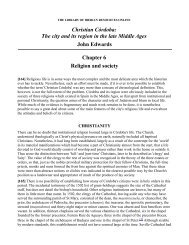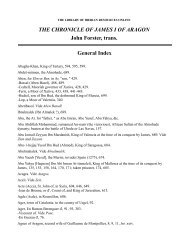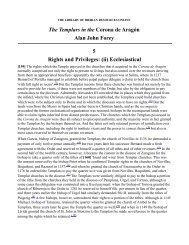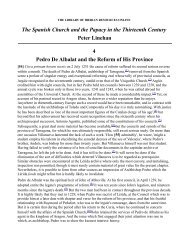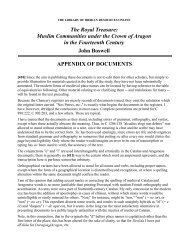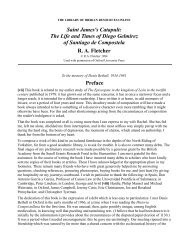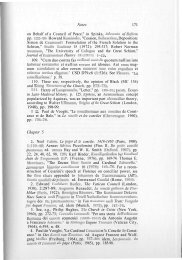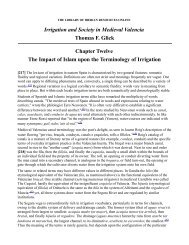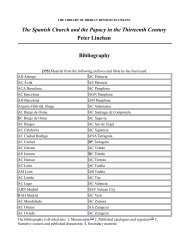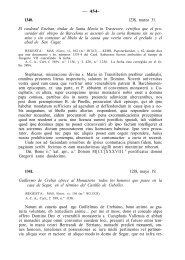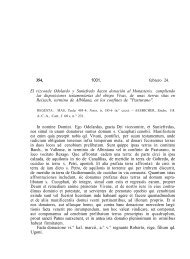PROTESTANTISM - The Library of Iberian Resources Online
PROTESTANTISM - The Library of Iberian Resources Online
PROTESTANTISM - The Library of Iberian Resources Online
Create successful ePaper yourself
Turn your PDF publications into a flip-book with our unique Google optimized e-Paper software.
examined and authorized its publication; its success was immediate, and it was universally read. From<br />
the standpoint <strong>of</strong> scholastic theology, however, it was too vulnerable not to invite attack from the<br />
religious Orders. <strong>The</strong> pulpits, which they virtually monopolized, resounded with their denunciations<br />
until Manrique felt obliged to interfere. Many prominent frailes were summoned before the Suprema<br />
and sharply reproved for exciting the people against Erasmus, in defiance <strong>of</strong> repeated edicts; if they<br />
found errors in the book, they should denounce them to the Inquisition. <strong>The</strong> challenge was promptly<br />
accepted and, with the assistance <strong>of</strong> the English Ambassador, Edward Lee, subsequently Archbishop <strong>of</strong><br />
York, a list <strong>of</strong> twenty-one articles was drawn up, ranging from Arianism to irreverence towards the<br />
Virgin and the denial <strong>of</strong> various essentials <strong>of</strong> sacerdotalism. <strong>The</strong>se were submitted to an assembly <strong>of</strong><br />
twenty theologians and nine frailes, who disputed for a month over the first two articles; the debate<br />
promised to be interminable, and Manrique suspended it, at the same time issuing an absolute<br />
prohibition to write against Erasmus. As we have seen, however, he fell into disgrace in 1529 and was<br />
relegated to his see <strong>of</strong> Seville; Charles left Spain the same year, carrying with him some <strong>of</strong> the most<br />
powerful protectors <strong>of</strong> the Erasmists, and the inquisitors, who were largely [415] frailes, were eager to<br />
detect the heresy latent in the latitude <strong>of</strong> speech which had become common among those who prided<br />
themselves on culture. (5)<br />
A typical case <strong>of</strong> this kind is that <strong>of</strong> Diego de Uceda, to which allusion has already been made on other<br />
accounts (supra, p. 68). He was an hidalgo <strong>of</strong> Córdova <strong>of</strong> unblemished Old Christian stock. Although a<br />
courtier, he was studious and deeply religious, even entertaining thoughts <strong>of</strong> entering the Geronimite<br />
Order. Greatly admiring Erasmus, the failure <strong>of</strong> the effort to condemn him by the Inquisition gave<br />
assurance that his works were approved, and Diego earned some repro<strong>of</strong> by constantly quoting his<br />
opinions and endeavoring to impress them on others. In February, 1528, he was journeying from<br />
Burgos to Córdova and, one evening at Corezo, he fell into discussion with a man named Rodrigo<br />
Duran who, with his servant, Juan de Avella, was on his way to Seville to embark for the West Indies.<br />
<strong>The</strong> talk fell upon confession and then upon images, in which Diego quoted the views <strong>of</strong> Erasmus; then<br />
upon miracles, when he expressed disbelief in a story <strong>of</strong> a Christian slave in Africa who prayed for<br />
deliverance to Our Lady <strong>of</strong> Guadalupe; his master overheard him, placed him in a chest, made his own<br />
bed on top and slept there, with the result that next morning the chest was in Guadalupe with the master<br />
inside and the Christian on top. Something also was said about Luther, whose name got mixed up with<br />
that <strong>of</strong> Erasmus. Duran, on reaching Toledo, denounced Diego to the tribunal, his serving-man<br />
furnishing the necessary conteste, and went on his way to the Indies. Diego was tracked to Córdova and<br />
was sent back as a prisoner to Toledo, where he vainly protested his orthodoxy and <strong>of</strong>fered submission<br />
to the Church, although his frequent allusions to Erasmus probably did his case no good. He proved by<br />
witnesses that he habitually confessed four times a year, that he took all indulgences and that he was a<br />
man <strong>of</strong> blameless life and strong religious convictions, but it was all in vain. I have already shown how<br />
he was tortured, confessed and then revoked, and how he was condemned to a humiliating penance,<br />
July 22, 1529, ruining his career and leaving an indelible stain on a family that had boasted <strong>of</strong> its<br />
limpieza. (6)<br />
[416] <strong>The</strong> danger impending over Erasmists is still more forcibly illustrated by the case <strong>of</strong> one who was<br />
regarded as perhaps the foremost among them in Spain. No man stood higher for learning and culture<br />
than Doctor Juan de Vergara. He had been secretary <strong>of</strong> Ximenes as Archbishop <strong>of</strong> Toledo, and<br />
subsequently to Fonseca, who succeeded to the primatial dignity in 1524. Ximenes had made him<br />
pr<strong>of</strong>essor <strong>of</strong> Philosophy at Alcalá, where he translated the Wisdom <strong>of</strong> Solomon for the Complutensian<br />
Polyglot, and the treatises de Anima, de Physica and de Metaphysica for the projected edition <strong>of</strong><br />
Aristotle. He was an elegant Latin poet, and Menéndez y Pelayo tells us that he was the father <strong>of</strong><br />
historical criticism. He was regarded with favor by Manrique and was a warm defender <strong>of</strong> Erasmus in



